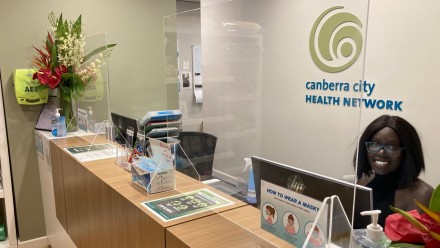Providing patient care during a pandemic
Share
Before COVID-19, odds are most Australians had never operated under constant threat of infection. Like many other “hands-on” services, allied health professionals suddenly had to work out how to treat people safely.
“Practice recommendations and clinical guidelines were slim in resources, if any, from governments and peak bodies. They were near impossible to locate in Australia, let alone the rest of the world. The variations in advice were from full lockdown to continue working with no specific governance given. These were, and are, the most challenging times for all health workers,” says Dr BJ Field, Osteopath and Director of Canberra City Health Network (CCHN).
To address this gap researchers from the Humanitarian Health Research Initiative (HHRI) at RSPH collaborated with CCHN and Health Departments* to develop checklists for allied health care staff and practitioners providing in-person care during the COVID-19 pandemic.
“There are many elements to infection control, such as cleaning, personal hygiene, and patient screening. Checklists like the ones we developed help ensure nothing gets forgotten,” says Tatum Street, project coordinator and PhD candidate at RSPH.
The project team worked closely with CCHN to build on “in-house” protocols CCHN had already developed. This included “shadowing” and interviewing allied health practitioners and administrative staff, and piloting the application of new checklists in the CCHN clinic.
“We identified where the CCHN checklist could be improved or expanded based on research evidence. Importantly, we also learnt from them. They had patient questions that went beyond the ACT or Commonwealth advice, for example they checked in on the patient’s mental health, and we thought this was useful,” says Street.
“We also learnt which solutions were practical to apply in this setting. CCHN staff are living this experience every day, so it’s important we listen to them.”
To this end, two checklists were developed. One for services delivered in a patient’s home, and the second for in-practice care. The HHRI research team is keen to note that these checklists are a guide, not a substitute for Government or peak body advice.
“These checklists are a guide that should be adapted to suit the requirements of individual practices and services. As the COVID-19 pandemic evolves, and as communities experience different levels of transmission, protocols should be routinely reviewed and updated to reflect the current context,” says Street.
“Patient screening processes should also be continuously reviewed and adapted to filter patients who have been in hotspot areas, for example. And checklists should also be tailored to include State or Territory restrictions.”
Allied health services are a core component of primary health care in Australia, and they must continue to operate as safely as possible during the COIVD-19 pandemic. These checklists can be rolled out to other allied health service providers to help them minimise the risk of COVID-19 transmission while providing face-to-face services.
“We deliver more than 30,000 health consults per year to our local community. If our services were not available, the health outcomes for our community would be poor. Our patients would fill emergency departments and other public health facilities, taking up much needed space in hospital. Worse still, many patients would not engage in health services at all if our clinic was closed,” says Dr BJ Field, CCHN.
“This clinical checklist developed with RSPH creates a living document which reflects the clinical reasoning of that practitioner and their clinic. This is a tool that enables all health practitioners to develop a filter to engage patients on the safest terms with the evolving COVID-19 environment.”
*This study was led by ANU in collaboration with CCHN, the offices of The Australian Capital Territory Chief Allied Health Officer, South Australian Chief Allied and Scientific Health Officer, and the Australian Government Department of Health. The checklists have been developed as broad guidance for providing in-person allied health services during COVID-19.
By Liz Drummond.











